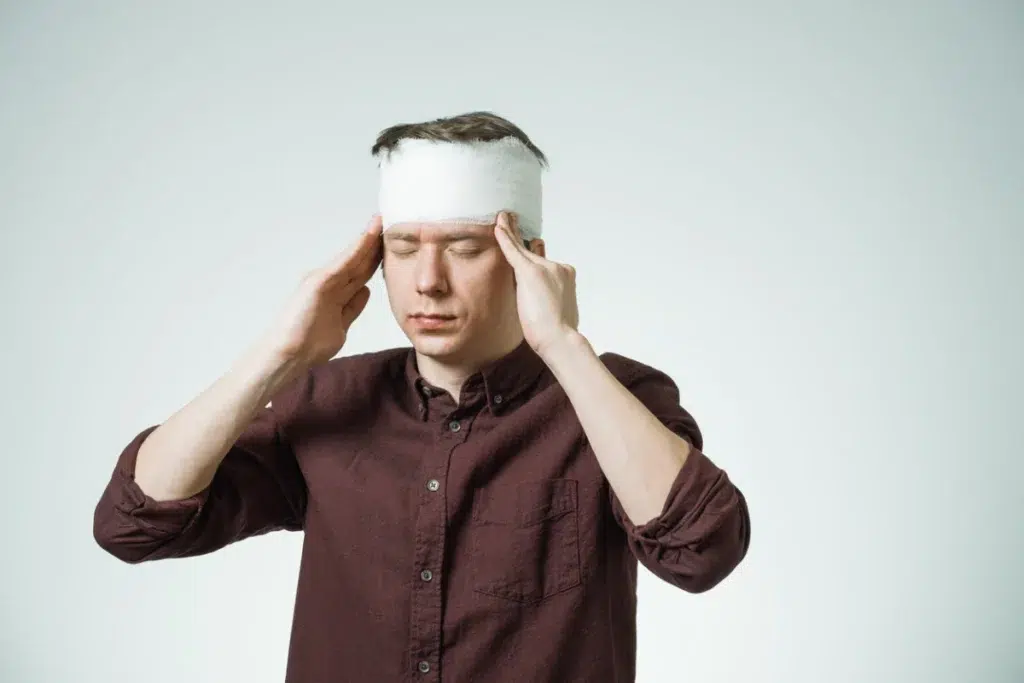
In an accident scenario, a traumatic brain injury (TBI) could leave you dealing with long-term health consequences and impact the rest of your life. Brain injuries pose a number of challenges because of the way they impact cognitive function, mood, and even personality. However, one of the biggest difficulties is proving a TBI in court.
Personal injury cases that involve brain injuries are complex, even those that revolve around concussions and other mild TBIs. They often require the injury victim to provide evidence of their condition in court. One of the reasons for this is that proving an injury has occurred isn’t always straightforward, so reaching fair settlements becomes difficult.
Unlike other types of injuries, brain injuries aren’t visible. Proving that you suffered one requires a significant amount of evidence, including testimonies from expert witnesses. What’s more, you can expect insurance companies to dispute all of it and claim you’re malingering.
So what are your options? Learn more about the challenges involved in proving a traumatic brain injury in court and why having an experienced attorney is essential.
What Is a Traumatic Brain Injury?
A traumatic brain injury occurs when an external physical force damages the brain. It’s usually the result of head trauma in the form of a blow or powerful jolt.
There are two main categories of traumatic brain injuries: penetrating TBIs and blunt TBIs. Penetrating brain injuries occur when something pierces the skull and enters the brain, damaging the neural tissue. In some accidents, a piece of the victim’s own skull can penetrate their brain.
If you’re in a car accident and a piece of metal punctures your skull and enters your brain, you’ve suffered a penetrating TBI. The severity of the injury will depend on many factors, including the areas of the brain that were affected.
Blunt TBIs are non-penetrating injuries that occur when something strikes the victim’s head hard enough to cause their brain to twist or bounce inside their skull. These are the most common forms of traumatic brain injuries and can be the result of a car accident, fall, workplace mishap, or even a recreational incident.
Symptoms of TBI’s
One of the most difficult aspects of TBIs is that they aren’t always immediately apparent.
TBI symptoms can take days to become noticeable, which delays treatment. When you hit your head hard enough for your brain to bounce inside your skull, damage to blood vessels and brain tissue leads to chemical changes, making your cells function differently from how they should.
Even mild traumatic brain injuries, more commonly known as concussions, can cause temporary cognitive impairments. Having an idea of what to watch for is important if you suspect that you or a loved one may have suffered a TBI.
Mild traumatic brain injury symptoms can include physical issues, sleeping problems, and a variety of other effects. The most common physical TBI symptoms for mild injuries are:
- Vomiting and nausea
- Headaches
- Balance issues
- Dizziness
- Fatigue
- Light and noise sensitivity
- Blurred vision
Some victims experience the sensation of being slowed down. You may also struggle to remember things or have difficulty concentrating and thinking clearly.
Additionally, social and emotional issues can arise from mild traumatic brain injuries, including feelings of anxiety, depression, and irritability. Mood changes can occur abruptly, and you may struggle to sleep normally.
Moderate and severe TBIs can present with a wide range of symptoms. Physical indications include all of the same ones for mild injuries, with the addition of the following:
- Severe hearing or vision problems
- Loss of consciousness
- Changes in sensory perception
- Severe headaches that don’t go away
- Convulsions
- Inability to wake up
- Clear fluid draining from the ears or nose
- Dilation of pupils
- Numbness or weakness in the fingers and toes
- Coma
Those with severe TBIs might also experience slurred speech and more extensive memory loss. There can be behavioral issues, too, such as:
- Aggressiveness
- Depression
- Anxiety
- Impulsivity
- Agitation
- Irritability
After suffering a TBI, you may struggle to manage your behavior and feel like you have little control over your thoughts and actions.
Complications of Traumatic Brain Injuries
If an injured person doesn’t give a traumatic brain injury the time it needs to heal, it’s likely that another TBI will occur. This is known as second-impact syndrome, and it has much more serious consequences. This condition causes the brain to swell, displacing brain tissues and putting the victim’s life at risk.
You could experience seizures for years after the initial injury and even suffer from a buildup of fluid in the brain, creating pressure that could cause a diversity of symptoms. You might experience blood vessel damage, as well, increasing your risk of developing blood clots.
With moderate to severe TBIs, there are further possible complications. You might suffer permanent brain damage or experience bleeding in the brain, which is life-threatening.
It’s even possible to enter into a vegetative state after suffering widespread brain damage. Such a condition can be permanent, though most people progress to a minimally conscious state where they have some awareness of their environment.
In the worst cases, brain death can occur if there’s no measurable brain activity and the body can’t breathe on its own. Sadly, brain death is irreversible.
Treating TBI’s
In most cases, a TBI diagnosis means the need for ongoing medical care. Unless you have a mild brain injury that only takes a few days to heal, you’ll likely need to rest for at least a week. You may need to be monitored for changes that point to complications, and you’ll have to attend a number of follow-up appointments with your doctor.
People who suffer moderate to severe TBIs require emergency medical treatment. Care providers will ensure that the victim is getting enough oxygen and that there’s adequate blood flow to the brain. Maintaining safe blood pressure levels is another critical focus. If there’s a risk of seizures, the patient may be prescribed medications to prevent them.
In extreme cases, doctors may even induce comas because the brain needs less oxygen to function in this state. This step may be unavoidable if vital blood vessels are damaged and not enough oxygen is getting to the brain cells.
Diuretics may also be an option to help relieve pressure in the brain as a result of a buildup of fluids. Surgery might be necessary if the swelling is significant.
In almost all cases, the victim will need rehabilitation sessions to help them relearn how to walk or perform other basic functions.
Why TBI Cases Face Legal Challenges
The challenges of proving TBIs narrow down to one main problem: It’s not always readily apparent that an injury occurred. If you’ve suffered a penetrating TBI and have bandages covering your skull, it’s easier to demonstrate that you were hurt, but what if you experienced a concussion? There may be no outward signs of the injury at all.
Proving causation is also tricky in these cases. Doing so requires demonstrating that the defendant’s actions directly resulted in the injury. Because the signs of a brain injury sometimes take days to appear, it’s easier for the defendant’s lawyer to claim that their client had nothing to do with the harm you suffered.
Proving TBI in court is even more complex if you have pre-existing conditions. The at-fault party might argue that what you’re experiencing is the result of that condition and not their negligent behavior.
Lack of Visible Evidence and Objective Testing Difficulties
The challenges in proving a TBI in court begin with demonstrating that the injury took place.
Medical evidence is crucial, but there could be testing issues; for instance, not all TBIs show up on imaging scans. CT scans can show if there’s bleeding in the brain or if bruises have formed, while MRI scans offer a detailed look at brain structures. However, even these imaging methods may not be enough.
In instances when brain imaging scans don’t offer the necessary proof, the victim and their legal representative can turn to neurological and cognitive tests. These tests will assess whether you’ve experienced memory loss and gauge your problem-solving, motor function, and speech skills.
For injured people who have fallen into a coma, another important medical assessment tool is the Glasgow Coma Scale. It assesses the level of consciousness after a TBI by gauging eye-opening responses, verbal cues, and a number of other factors.
That said, these assessments can sometimes come down to interpretation, so it’s possible for the other party to dispute the results.
Overcoming Defense Arguments That Minimize TBI Claims
When considering how to prove TBI in court, you and your attorney will need to overcome all of the potential arguments the defendant’s legal team might bring up in hopes of defeating your claim. Here’s what to focus on:
Present Strong Medical Evidence
Your medical records will be pivotal to your case, especially if there are no outward signs of a traumatic brain injury. The results from all of your previous imaging scans, along with expert testimony from qualified medical professionals, can be invaluable.
Address Pre-Existing Conditions
If you have any pre-existing conditions, the defendant’s insurance company may bring them up in an attempt to discredit you. This is another instance when having detailed medical records can protect your right to seek compensation. You can provide evidence of your condition before and after the traumatic event, presenting a clear distinction.
Offer Witness Testimony
The defendant’s team may suggest that you’re pretending, or that your injury isn’t as serious as you’re making it out to be.
One of the ways you can refute such suggestions is by offering testimony from people who knew you before the accident, such as friends and relatives. These individuals can state how the brain injury has affected your personality and your quality of life.
Focus on the Consistency of Your Symptoms
Another important way to counter arguments that the injury isn’t real or serious is to present evidence that points to the consistency of the symptoms you’ve dealt with. Highlighting missed work days because of severe headaches or witness accounts that speak to concentration or memory issues can demonstrate the seriousness of your TBI.
The Role of Medical and Expert Testimony in TBI Cases
In many cases, there isn’t enough objective physical evidence to definitively show that a TBI has occurred. Brain imaging scans may be inconclusive, or what they show can be so subtle that a layperson won’t be able to spot the problem. For this reason, outside medical analysis may be instrumental.
Seeking testimony from medical professionals allows you to offer the court a clear picture of your symptoms, how they’ve progressed, and how the treatment process is shaping up. All of this information is vital for proving TBI in court, as well as for calculating the damages you may be entitled to.
Expert testimony can also help establish causation. A physician can explain how the traumatic event directly resulted in the injuries you sustained.
For example, if you were in a car accident and hit the right side of your head on impact, imaging scans that show a bruise on that side of the brain can form a solid link. This is especially important when pre-existing conditions may be a confounding factor.
In court, medical testimony helps the judge and jury gain a better understanding of the impact a TBI can have on the victim’s overall quality of life. A medical expert can interpret the information found in your medical records and what it means for you and your loved ones.
Proving the Long-Term Impact of a TBI on Daily Life
To demonstrate how a moderate or severe TBI has affected your day-to-day life, you’ll need comprehensive evidence that includes medical records, personal accounts, and witness testimonies. Many people focus on the hard evidence from imaging scans, but there are other important types of medical documentation as well.
For example, physical therapy records with notes from the therapist can describe the struggles you’ve faced during the recovery process. These documents can offer insight into your balance, coordination, muscular strength, mobility, and any sensory issues you’ve noticed.
You may also have undergone behavioral assessments. If so, the examining professional’s notes can underscore mood issues and personality changes.
One of the recommendations your medical team and lawyer will likely make is to start keeping a journal of your experiences as you recover from your injury. This firsthand account can offer insight into the impact your traumatic brain injury has had on your life, such as difficulty dressing, walking, and performing other daily tasks.
If you’ve had trouble at work due to the TBI, presenting evidence of this can bolster your claim. If you’ve been unable to work or had to cut back on your hours, solicit the testimony of your employer or coworkers. They can speak about the difficulty you’ve had getting back to normal.
Because TBIs can cause personality changes and mood disturbances, your interpersonal relationships may suffer. Statements from loved ones who have noticed these changes can attest to their veracity.
Your team can also compile scientific studies detailing the specific ways a TBI can impact daily life. Such studies can suggest the long-term outcome you can expect, which not only makes your case more solid but also makes it easier to justify comprehensive compensation.
Legal Strategies to Strengthen a TBI Case in Court
Avoiding the potential pitfalls of taking a TBI case to court will require you to rely on several key legal strategies. Here’s how to build as strong a case as possible:
Gather a Wealth of Varied Evidence
Having the right evidence (and a substantial amount of it) that presents a clear picture of how you sustained your injuries and what impact they’ve had on your health and life more broadly is imperative.
All too often, injury victims make the mistake of focusing on only one type of evidence, such as medical records. This approach isn’t nearly as effective as having a variety of forms.
Your attorneys will collect all relevant medical evidence and encourage you to keep a record of your symptoms and recovery. They may also ask your loved ones to testify about how your life has changed since your accident.
If there’s an official accident report, take steps to obtain a copy. It will provide insight into how your injury came about, which can go a long way toward establishing causation.
By organizing an array of compelling evidence, you can convey that your symptoms are consistent and that their impact on your life is real. This will be much easier to do with an experienced lawyer assisting you, as they’ll have a precise understanding of what evidence will be most helpful.
Arrange In-Person Testimony
Medical records and police reports can only take your case so far on their own. The words of those who have assessed you medically or live with you can make a more meaningful impression on the jury and judge. Personal testimony brings more credibility to the evidence and can greatly enhance your case.
Clearly Establish Liability
When focused on proving TBI in court, your legal team will work tirelessly to prove that the defendant’s conduct resulted in your traumatic brain injury. Establishing liability is one of the requirements for filing a personal injury lawsuit, and this duty falls to the plaintiff.
In other words, you must prove that negligence was a primary factor in your accident. Doing so will require you to show that the other party owed you a duty of care and failed to live up to it.
If you slipped and fell in a store with a wet floor, for example, you could hold the property owner or manager liable because they had a duty to maintain reasonably safe premises for you and other customers. If they knew or should have known about the wet floor and did nothing to resolve the problem, they breached their duty.
From there, it will be necessary to connect the defendant’s conduct to the losses for which you’re seeking compensation. Following a traumatic brain injury, you stand to receive damages for essential medical care, as well as any other financial or personal losses you’ve endured.
Document Your Losses Thoroughly
To obtain the compensation you deserve, you must have significant documentation showing how the injury has affected you financially. Make it a point to maintain clear records of the medical expenses you’ve incurred and those you might face in the future if your injury is severe enough to require ongoing medical care.
TBI victims often can’t return to work, which means they won’t receive the income they would otherwise have earned. Documenting your lost wages and benefits is crucial if you won’t be able to go back to work in the same capacity or at all.
Not all losses are financial, however.
Your attorneys can present evidence revealing how your injury has diminished your overall happiness and the emotional distress you’ve experienced due to the life-altering event that caused the TBI. They may rely on witness testimonies, journal entries, and anything else that spells out how your injury has transformed your day-to-day life.
Why Delfino Green & Green Is the Right Firm for TBI Cases
If you’ve suffered a traumatic brain injury in an accident that occurred because of another person’s negligent, reckless, or malicious actions, a skilled attorney can help you recover the compensation you need to rebuild your life.
Delfino Green & Green has helped countless TBI victims successfully pursue legal claims of all types and complexities. We’re a client-focused firm, which means you’ll always receive personalized care and attention as you navigate the claims process.
We know how stressful and frightening it can be to suffer cognitive impairments as a result of head trauma, and we promise to do everything in our power to make the process of filing an injury claim or lawsuit as easy as possible for you.
Our team has over three decades of legal experience, which we’re prepared to put to work on your behalf. We’re fierce litigators who have helped California injury victims recover more than $100 million throughout the lifetime of our firm. We never shy away from a fight if it means protecting our clients’ interests.
You won’t have to worry about upfront costs when you hire our team. Because we understand the financial strain you’re likely under, we work on a contingency basis, meaning we only get paid if we win your case. We don’t even charge for the initial consultation.
You shouldn’t deal with the aftermath of an accident that’s left you with a traumatic brain injury without dedicated legal representation. The capable team at Delfino Green & Green can fight for fair compensation on your behalf. Contact us today to schedule a free consultation.



